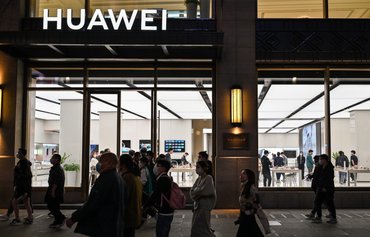BEIJING -- The spy balloon incident that captured the world's attention earlier this month exposed real divisions of sentiment among Chinese citizens on social media -- and prompted speculations of more concerning divisions within the Chinese government.
Beijing is running a "well funded, deliberate programme" to use high-altitude, hard-to-detect balloons for spying on the United States and other countries, US National Security Council spokesman John Kirby said Tuesday (February 14).
The United States has recovered important sensor and electronics parts from a suspected Chinese surveillance balloon it shot down February 4, the US military said Monday. The balloon spent several days flying over North America, including over a series of top secret nuclear weapons sites.
Beijing denies it uses spy balloons and says the huge craft shot down off the east coast of the United States was for weather research, while another spotted over South America was for pilot training.
![US sailors assigned to Explosive Ordnance Disposal Group 2 recover a high-altitude surveillance balloon off the coast of Myrtle Beach, South Carolina, February 5. [US Navy]](/cnmi_am/images/2023/02/17/40802-fox3mg4xgaibxpk-600_384.jpg)
US sailors assigned to Explosive Ordnance Disposal Group 2 recover a high-altitude surveillance balloon off the coast of Myrtle Beach, South Carolina, February 5. [US Navy]
Meanwhile, a fresh analysis of unidentified aerial objects that flew over Japan's airspace in recent years -- in November 2019, June 2020 and September 2021 -- "strongly" suggests they were Chinese spy balloons, Tokyo's Defence Ministry said in a statement late Tuesday.
'The wandering balloon'
Typical of Chinese officials and state-controlled media, statements coming out of Beijing over the incident were starkly one-sided and attempted to divert attention from the real issue.
On Tuesday, Chinese Foreign Ministry spokesperson Wang Wenbin doubled down on unsubstantiated allegations that the United States has sent over 10 balloons over Chinese airspace since last year.
Wang did not provide evidence of the alleged incursions, which he said started in May 2022. He previously told journalists the incursions began in January 2022.
Washington has denied Beijing's claims.
In another example, Xijin Hu, the former editor-in-chief of Global Times, a daily tabloid newspaper published by the Chinese Communist Party, accused the United States of being "drunk".
"China is dealing with an America that is drunk without drinking, bearing the animosity generated by its internal struggles and spilling over onto the international stage," he wrote on Weibo.
While some Weibo users took the bait and ran with the Chinese government narrative, many expressed indifference and even derision.
"The wandering balloon" became a popular means in which to describe the international incident.
The term not only implies that the balloon strayed from its course because of an accident, but also made the topic a butt of a number of jokes.
The name evokes the Chinese science fiction movie "The Wandering Earth 2", a box office hit released on January 22.
Some netizens joked after finding out that the balloon had been retrieved, "So, is this the start of shooting 'Wandering Earth 3'?"
Unanswered questions
Other Chinese users on Weibo said openly that China should not be provoking another country with such an outdated method of surveillance.
One netizen wrote, "Is it necessary to investigate another country who is on the other side of the ocean in such a way with balloons? High-resolution satellites are already clear enough."
Another social media user wrote: "Regardless, a balloon this big floating into another country's airspace is frightening. Other than shooting it down, how do you know what's inside it? If there's a bomb inside, aren't you afraid?"
Many Chinese social media users expressed serious concern over the lack of official information regarding the purpose of the balloon.
One person wrote, "Which unit does the balloon belong to? What's the purpose for it? It's better to be clear."
When reporters pressed Foreign Ministry spokesperson Mao Ning for an explanation, she was vague and evasive.
"The Chinese side has given information about the unmanned airship on several occasions. I don’t have anything to add at the moment," she said February 7.
"The US should stop its endless escalation; China will make necessary responses if the situation develops," Mao also said of the situation.
This phrase -- "The US should stop its endless escalation" -- has become the latest "golden sentence" from the Chinese Foreign Ministry, forwarded and commented on by multiple we-media accounts.
A clumsy mistake
Other observers speculate that the flight path of the balloon was a clumsy mistake, calling into question how accurate the Chinese government's judgment would be if confronted with a more serious crisis.
It is not likely China's leadership would have authorised the balloon's flight to the United States had it been aware of its journey, given the planned -- now cancelled -- visit of US Secretary of State Antony Blinken, said M. Taylor Fravel, director of the Security Studies Programme at the Massachusetts Institute of Technology and an analyst of China's military.
Blinken would have been the first secretary of state to travel to China in more than five years.
"I can only speculate about the intentions of the unit that launched the mission: They may have been unaware or unconcerned about any political fallout should it be discovered, or perhaps they were executing longstanding plans without any attention to the diplomatic calendar," Fravel told The New York Times in an email.

![US sailors assigned to Assault Craft Unit 4 prepare material recovered in the Atlantic Ocean from a high-altitude balloon for transport to federal agents at Joint Expeditionary Base Little Creek on February 10. [US Navy]](/cnmi_am/images/2023/02/17/40801-fo70y3rakamt5qr-600_384.jpg)





